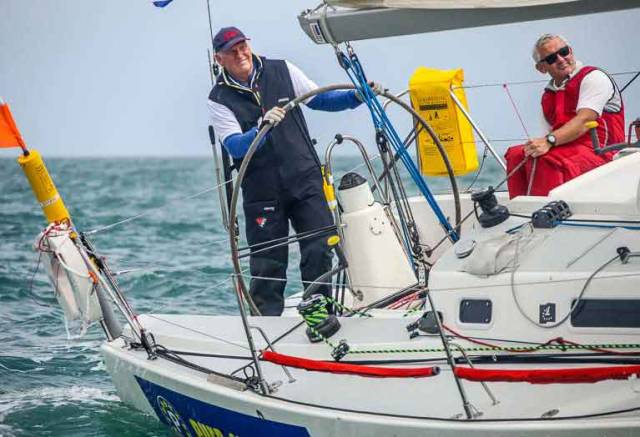On the other hand, ICRA could equally mean 'Ireland’s Cool Runnings Assembly'. In the week in which the Travelling Community was granted Ethnic Minority Status, W M Nixon finds himself among two groups which might be equally deserving of such recognition.
You know how it is as we swing into Spring and its embarrassment of Saturday choices. There it was, Saturday 4th March coming up on the busy agenda, and the inevitable dilemma. Should we be in Cowes for the Annual General Meeting of the Association of Yachting Historians in the Squadron castle? Or was appearance mandatory at the Irish Cruiser Racing Association’s day-long Annual Conference in Limerick, followed by a mysterious awards ceremony that night in the Royal Irish Yacht Club in Dun Laoghaire?
The old Learjet being no longer airworthy, it was a case of staying on the Irish island rather than that of Wight, and trusting that our car-of-a-certain-age-of-a-Swedish-brand-which-is–no-longer-manufactured would be up to the rigours of the M7. For the fact that trains go only to railway stations rather than your actual destination made the car the only option for a trans-island logistical challenge in very limited time.
 The ICRA Annual Conference has become a staple of the early Spring programme
The ICRA Annual Conference has become a staple of the early Spring programme
I know some people do double journeys like this five days a week as part of their working lives, and take it for granted. However, as one who rates long-distance commuting right up there with wind farms as one of the crazier things about modern life, it’s quite an effort to get the body there and back again, and the soul takes even longer.
What on earth can it all be for? But then you step into the Conference Centre in the Castletroy Park Hotel with everyone – most of them acquaintances and many old friends - sat in companionable comfort around a mega-table as though we’re negotiating peace in Syria. And it’s like stepping into a judiciously-drawn bath of the perfect temperature. For these are kindred spirits, upwards of seventy of them from all parts of Ireland, and we’re going to talk about boats and sailing matters all day. Bliss.
For an outsider, though, I can see that this must seem like a separate species talking in their own language. The thought of Travellers rattling away in Shelta at the Ballinasloe Horse Fair springs to mind. So yes indeed, let’s give ICRA enthusiasts Ethnic Minority Status. After all, like Travellers, ICRA people’s special enthusiasm in life is to pack themselves into crowded damp spaces and try to move around and possibly get somewhere else at least as soon as the others. And when they do get there in any significant numbers, it disturbs the peace of the neighbourhood and creates nervousness in parents with daughters of a certain age, fearful that they might be attracted to the nomadic life.
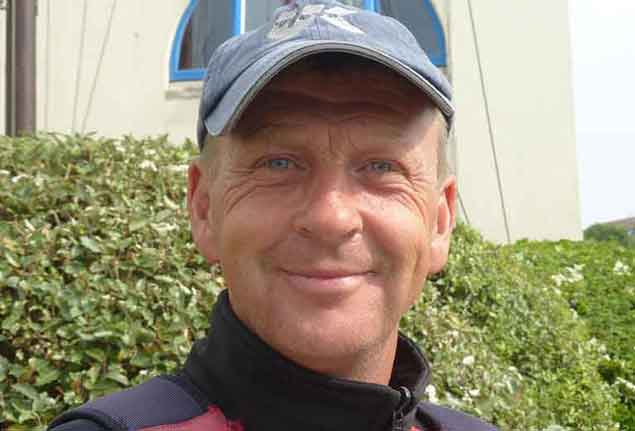 Simon McGibney leads ICRA with energetic enthusiasm
Simon McGibney leads ICRA with energetic enthusiasm
But enough of such dreaming, there was serious business to be done. And with people of the calibre of ICRA Commodore Simon McGibney of Foynes YC and ICRA number-cruncher Denis Kiely of Kinsale as joint MCs, the pace was impressive.
Simon is the leaping-about man, making his points here, there and everywhere, and when he reckons he isn’t everywhere enough, his fellow Foynes yottie and sailing instructor Elaine O’Mahoney dances in to give assistance.
Denis by contrast is Buddha-like. He sits in the one place with a commanding view of everyone, and orchestrates proceedings and Q&A sessions with a natural authority which makes you think he should be right there in Geneva or wherever it is, bringing order and peace to the Middle East.
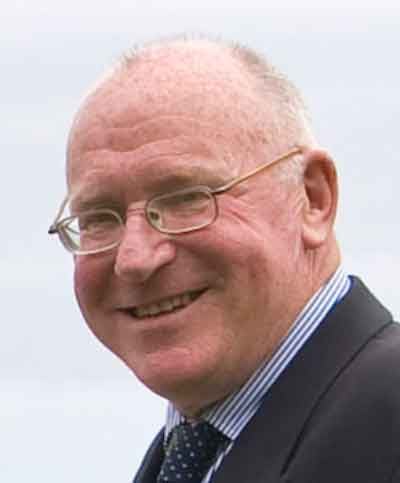 Denis Kiely gave us all an object lesson in how to orchestrate a conference and handle Q&A sessions
Denis Kiely gave us all an object lesson in how to orchestrate a conference and handle Q&A sessions
For people for whom sociable business conferences are a regular part of life, I presume all this is all run-of-the-mill. But I’m the single spy who works alone in a rat’s nest of an office with a clutter of material within arms reach when it’s not available on the proper-size screen which rules my life, so experiencing human interaction at this level is bracing, to say the least.
And the ICRA annual gathering is such a clearcut focal point for a certain type of sailing enthusiast that it attracts international attention. Last year, we had Dobbs Davis and Zoran Grubisa of the Offshore Racing Congress promoting their measurement rule. As one had travelled from America while the other had come from Croatia to spread the message, I suppose the fact that the man from the International Rating Certificate office had only come over from Lymington to talk to ICRA wasn’t such a big deal. But Mike Urwin is such an obliging bloke, and an entertaining speaker with it, that we can’t help but nurture a secret hope that the possible discussions under the aegis of the RORC about amalgamating the two systems go on for ever, for their success might deprive us of entertaining speakers….
 Mike Urwin made the case for IRC in engaging style
Mike Urwin made the case for IRC in engaging style
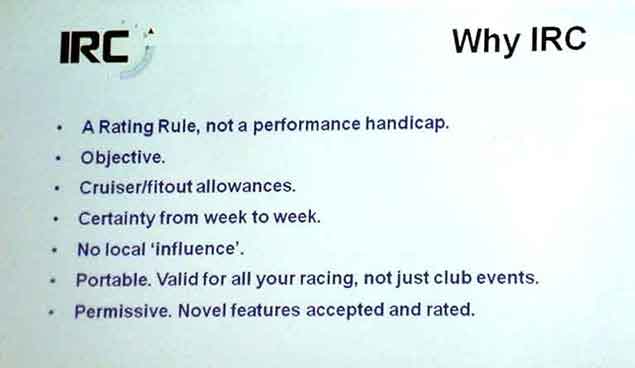 What the IRC does
What the IRC does
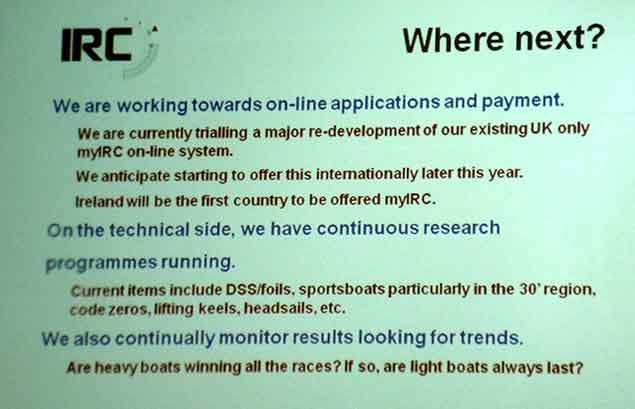 The prospects for IRC. Ireland is going to be the test-bed for the internationalization of the online service.
The prospects for IRC. Ireland is going to be the test-bed for the internationalization of the online service.
I’d an insight into the special role Mike fills in the international offshore racer community one summer’s evening a year or two back, when I’d an email from a guy on quayside in the Mediterranean where he’d found himself looking at the Ron Holland-designed Irish Mist II of 1975 vintage, and that very special boat had a Se Vende notice. She was built in Cork for Archie O’Leary to come out as a distinctly potent machine around 40ft long, and our man on the quay guessed that he might have a worthwhile performer for the Committee International Mediterannee (CIM) vintage IOR class, if only he could be sure that an IOR Rating for Irish Mist II from the 1970s could be given full provenance.
When you get such a message outside of what used to be called working hours, time was when you’d put off dealing with it until the next morning. But I simply fired off an email to Anthony O’Leary whom I knew to be doing Cowes Week in Antix at the time, and from the midst of some après sailing pub came the message: “Mother of God, does this guy think I carry a filing cabinet around with me? And anyway, in the 1970s I’d better things to do than look after the paperwork”.
But then half an hour later from another pub came the message “Rob Jacob says we should signal Mike Urwin, will let you know”. And believe it or not, before the night was out, we had the word that Mike had been able to access an IOR Rating Certificate for 1978 for Irish Mist II, and all was well with the world.
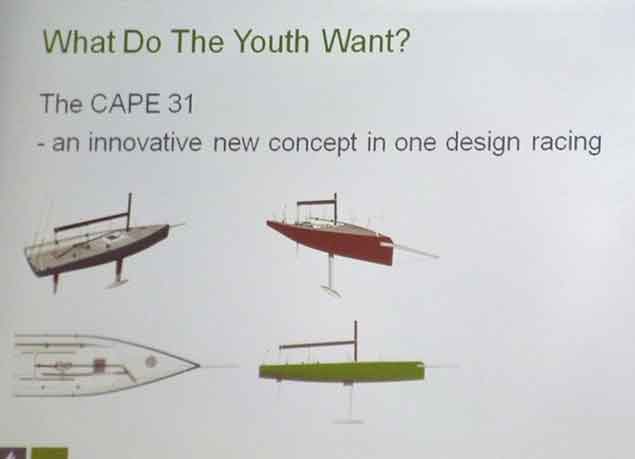 Nobby Reilly is convinced young Irish sailors will be looking to boats like the new Mark Mills-designed Cape 31. Old salts will know the original Cape One Designs of 1956 provided the hull shape for the famous Black Soo.
Nobby Reilly is convinced young Irish sailors will be looking to boats like the new Mark Mills-designed Cape 31. Old salts will know the original Cape One Designs of 1956 provided the hull shape for the famous Black Soo.
As to matters in Limerick, the conference got off to an energetic start with former Commodore Nobby Reilly of Howth analyzing what the new generation seeks in cruiser-racers to guide us into a theme of the day, the ever-present need to make the world aware that cruiser-racing – whether inshore or offshore - can be great sport. And the tinkering with your boat to maximize your rating is not a drawback - on the contrary, it’s part of the technical interest of the sport in its broadest sense. On top of that, there’s funding available from ICRA for clubs which want to develop cruiser-racing as part of their local programme, and there’s a wide range of support material which will raise the ICRA presence in your area and prove mutually beneficial.
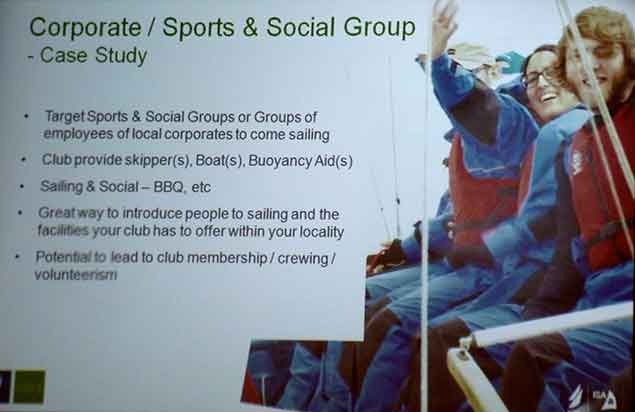 A case study of corporate promotion was presented…..
A case study of corporate promotion was presented…..
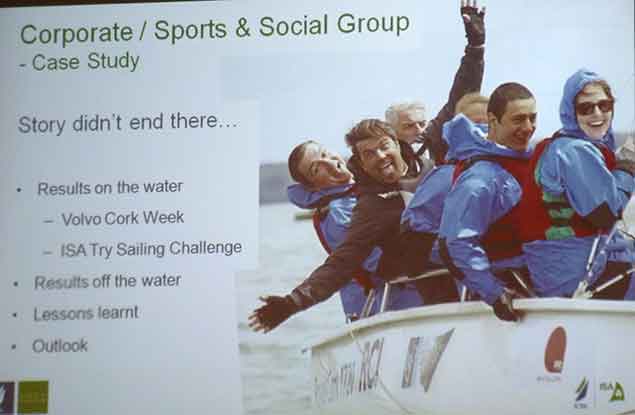 ….and we got the follow-up too
….and we got the follow-up too
Particularly interesting was the presentation from Colin Moorehead with useful interjections from Denis Kiely about how the Training Grant scheme and the promotion with the ISA of the Try Sailing project in the context of Colin’s own club, the Royal Cork, had been so successful that at Afloat's and the ISA's National Sailing Awards at the end of January, Colin was singled out for an award himself.
Simon McGibney then took over for an energetic outline of the working of the Crewpoint scheme, to let people know that the most important thing – as in so many areas of life – is simply to turn up, ICRA and other volunteers will take it from there, and you’ll get your introduction to sailing.
 Simply turn up – the ICRA, ISA and Club volunteers will take it from there
Simply turn up – the ICRA, ISA and Club volunteers will take it from there
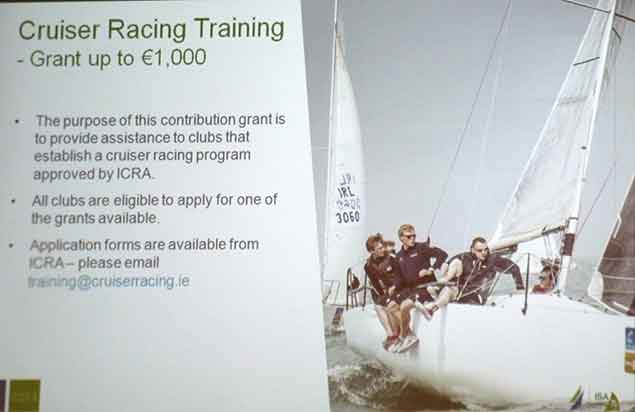 Need we say more?
Need we say more?
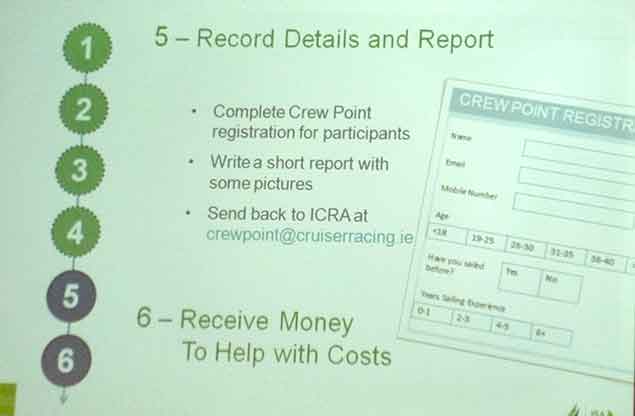 All that ICRA ask is that you clearly display their banner and don’t just leave it in a cupboard, and you report back to them on the progress of the programme
All that ICRA ask is that you clearly display their banner and don’t just leave it in a cupboard, and you report back to them on the progress of the programme
Sensibly refreshed by lunch, we found any tendency to a post-prandial zizz completely blown away by Maurice the Prof O’Connell’s presentation on Embarr’s world championship win. It was riveting stuff, with the effort involved generally – and not just the superhuman dedication to achieving maximum fitness and optimum crew weight – giving a vivid illustration of the utter diversity of our sport, which takes in everything from gentle sailing in a local classic class to the Worlds of specialist boats like the Melges 24.
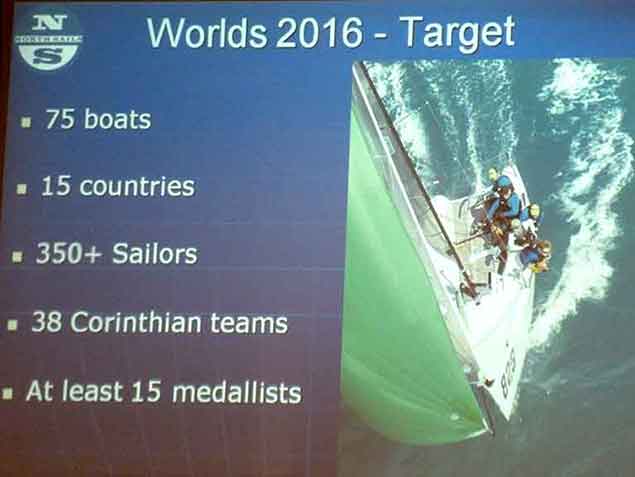 A mountain to climb – the target set for Conor Clarke’s Embarr
A mountain to climb – the target set for Conor Clarke’s Embarr
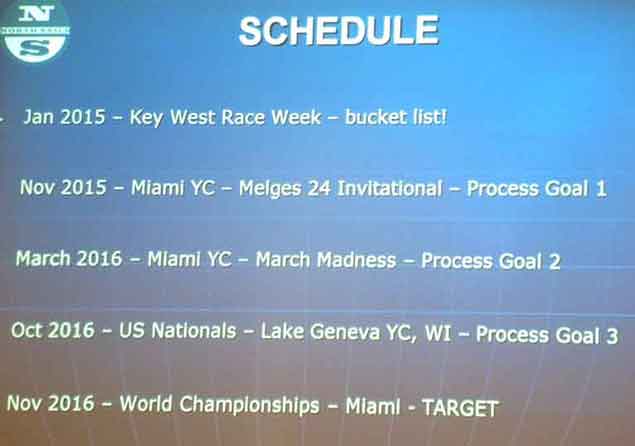 The programme to get there…
The programme to get there…
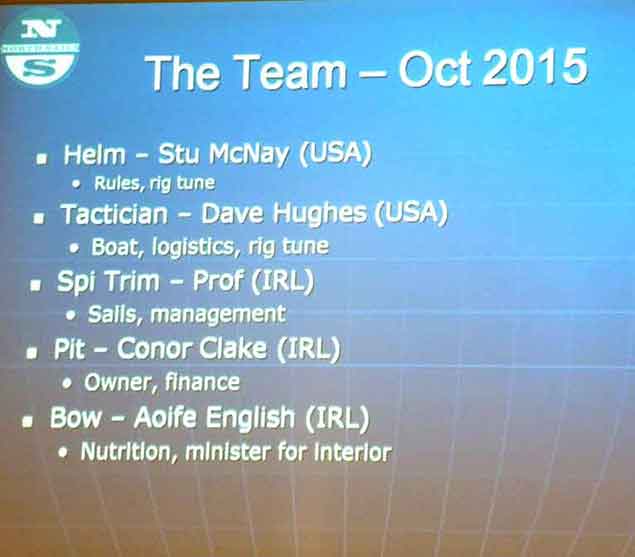 And the team that did it
And the team that did it
It’s easy to complain that the existence of more than 150 recognised World Championships in sailing dilutes the impact of the sport. But the truth is that this diversity is central to the whole picture, and sailing benefits by so many valid prizes being available for the wide range of One Design classes.
And that’s before we moved on to Mike Urwin’s presentation on the added level of diversity which is dealt with through the IRC. Of particular interest in Ireland was his assertion that “protecting the existing fleet” is at the core of the IRC’s functioning, for the fact is many of us are optimising and actively racing boats which would be older than those found elsewhere.
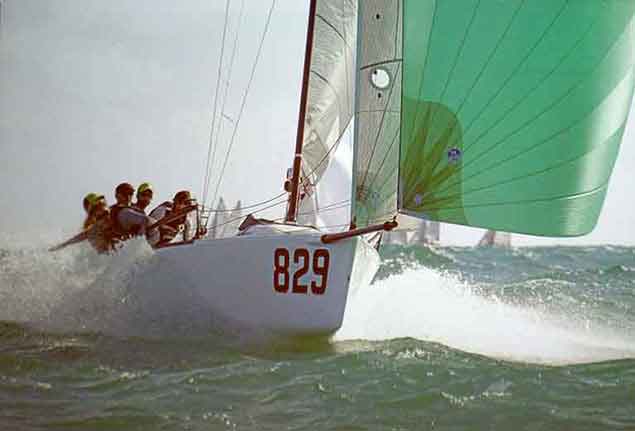 We have a result…..Embarr on her way to winning the Worlds, November 2016
We have a result…..Embarr on her way to winning the Worlds, November 2016
We do so through a crowded programme of events. ICRA tries as far as possible to take the mission to as many clubs as possible, thus it prefers to maintain the independence of its National Championship, rather than subsuming it into some larger regatta. So special attention was paid to Paul Tingle of Royal Cork, as he is organising the ICRA Nats there on from June 9th to 11th. It’s a time when the activity levels are soaring throughout sailing, but the lure of the Nationals carry their own appeal against what might be seen as rival events.
Certainly regular readers of Afloat.ie will be well aware of the energetic levels of discussion as to how the annual sailing programme might be better structured. But if you insist on amalgamating events and championships, you reduce the significance of the prizes involved. Not everyone aims to win a World championship, but it’s encouraging to any crew to finish with their name up in lights just now and again. So in tandem with the continuation of a crowded programme, the development of ICRA’s Progressive ECHO performance handicap system is another important part of this significant organisation’s contribution to Irish sailing.
As ever, the conference ended on the highlight of ICRA “Boat of the Year”. On Afloat.ie in the week from Monday February 27th until the conference itself on Saturday March 4th, we ran an online poll which had a very gratifying response. But as with other awards, it was done in the knowledge that such polls are only advisory, as judges have a job to do to keep populism under control.
Thus in the Afloat.ie poll. Jonny Swann’s Half Tonner Harmony from Howth topped the votes at 949 (39.9%) while John Maybury’s J/109 Joker 2 from the Royal Irish YC in Dun Laoghaire logged 831 votes to come in at 35%. Yet it was Joker 2 which became Boat of the Year 2016, and rightly so, but maybe somebody should have come up with an award for Boat Which Most Stylishly Survived A Port Tack Mark Rounding Event During A Major Championship Trophy for Harmony…
Taking the road home for that night’s awards event at the Royal Irish, the thought processes were at first dominated by ideas put forward by Peter Ryan the chairman of ISORA, and John Hughes who has now taken on the mantle in Wicklow of running the Round Ireland Race, as I’d been sitting with the two of them during the Conference.
Both as ever were bubbling with ideas, but John particularly has one which will be of interest, as on the same day as he starts the next Round Ireland Race in June 2018, he will start a much shorter co-event, from Wicklow to Cork Harbour, with the Royal Cork at Crosshaven hosting the finish.
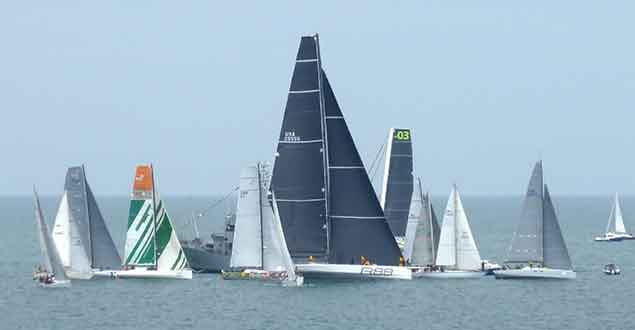 George David’s Rambler 88 finding her way through a motley fleet at the start of the Volvo Round Ireland Race 2016. What would it be like if the start of the classic Round Ireland Race in June 2018 was combined with its proposed new shorter sister, the Wicklow to Cork Race? Photo: W M Nixon
George David’s Rambler 88 finding her way through a motley fleet at the start of the Volvo Round Ireland Race 2016. What would it be like if the start of the classic Round Ireland Race in June 2018 was combined with its proposed new shorter sister, the Wicklow to Cork Race? Photo: W M Nixon
The debate was whether or not he should start the shorter race before or after the main event, but it was somewhere in the midst of zooming through a rainshower in Laois that I realized he should start them together. Boats would be invited to enter both races (at the full entry fee, of course) and then as they’re slugging to windward off Cork Harbour on Sunday night and in the small hours of Monday morning, when some sad and seasick crewman says he or she wishes they were racing to Cork Harbour, the kindly and generous owner-skipper can say: “We are!”, he then throws a right into Cork Harbur, but they still have a result…..
It was all a suitably daft scenario to get oneself in the right frame of mind for dinner through an evening and night in the Royal Irish Yacht Club in Dun Laoghaire, an establishment of which a notably acerbic observer of Irish sailing has remarked: “Irish sailing is divided into those who get the Royal Irish, and those who don’t, and that’s all there is to it”.
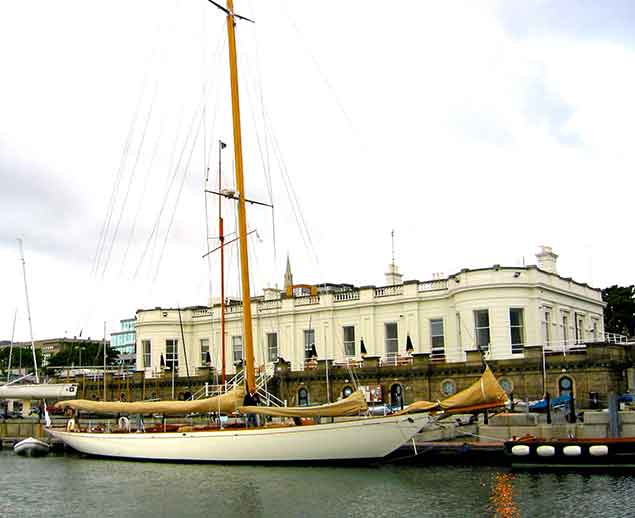 “You either get it, or you don’t…..” The Royal Irish Yacht Club in Dun Laoghaire, with the Fife-desgned 70ft Hallowe’en, line honours winner in the 1926 Fastnet race, berthed alongside. Photo: W M Nixon
“You either get it, or you don’t…..” The Royal Irish Yacht Club in Dun Laoghaire, with the Fife-desgned 70ft Hallowe’en, line honours winner in the 1926 Fastnet race, berthed alongside. Photo: W M Nixon
Definitely a case for Ethnic Minority Status here too, one might think. But anyone who reckons this unique establishment is above the hurly burly of every day competition afloat would already have been put right by being in Limerick, and realizing that both Conor Clarke’s Embarr and John Maybury’s Joker 2 are part of the Royal Irish fleet. Nevetheless I’d received an invitation that could be interpreted ever which way, so the best thing was to hide oneself in a table of very good friends among whom the classic boat ownership included two Water Wags, three Howth Seventeens, and an indeterminate number of Dublin Bay 21s, two of which may have changed hands during the course of the evening.
Next door to us was the much larger and more boisterous assembly of George Sisk’s crew apparently - as since revealed in Afloat.ie - deciding they were by no means past it yet, and working towards supporting their skipper in a decision for a new Class Zero boat. The evening drew on, and then with classic laid-back RIYC style, Rear Commodore (Sailing) Patsy Burke oversaw the awards which saw the following honours:
Boat of the Year: Jim McCann & Paul Cadden (Peridot)
Cruiser of the Year: Des Cummins & Storme Delaney (joint winners)
Best International: Saskia Tidey and Andrea Brewster (49erFX)
Best IRC: Colin Byrne (Bon Exemple)
Best Cruiser-racer ECHO: George Sisk, WOW
Traveller Award: Paul Smith & Pat Mangan (Jill)
Best One Design Result: Ger Dempsey & Chris Nolan (Venue’s World)
Best White Sail Result: David Clarke (Fortitudine)
Contribution to Sailing: Henry Leonard
Most improved boat: Derek Butler (Borraine)
Best Big Boat Performance: Enda O’Coineen (Kilcullen Voyager)
Volunter of the Year (House): Winifred McCourt
Volunteer of Year (Sailing): Tim Carpenter & Kevin Leonard (joint winners)
Most improved Adult Sailors: Katherine Sheehan & Tony Barlow
Somewhere in the midst of it, your reporter received an award for scribbling, And as you’ll note the intrepid Enda O’Coineen was honoured for his astonishing achievements against the odds during 2016 in his Open 60 Kilcullen Voyager, for it was a cruel swipe of fate that his mast should come crashing down on January 1st 2017.
Thus your reporter was left looking like a stunned mullet, as for some reason I’d got it into my head that there was a literary dimension to it all, and the reason I’d been invited was to honour Enda O’Coineen’s best contribution to Irish sailing in 2016. We highlighted it here on Christmas Eve. But it’s well worth looking at again:




























